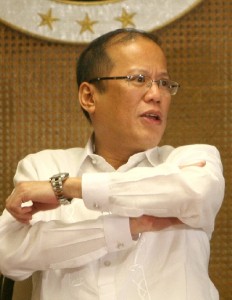MANILA, Philippines—The President is set to announce his administration’s new mining policy on Monday (July 9) but the Catholic Bishops’ Conference of the Philippines (CBCP) has already started a signature campaign calling for a moratorium on its implementation.
The CBCP started gathering signatures from its members over the weekend to also push for the urgent passage of an alternative mining law even as Malacañang appealed to all to “hold off any comment” until the release and public discussion of the new mining policy.
The Palace said President Aquino’s newly signed executive order (EO) spelling out his administration’s mining policy would be released on Monday.
But Manila Auxiliary Bishop Broderick Pabillo, head of the CBCP National Secretariat for Social Action (Nassa), launched a signature campaign to stop the implementation of the EO during a three-day plenary assembly of Catholic bishops, which ends Monday.
Pabillo presented to some 100 bishops assembled at the Pope Pius XII Catholic Center in Manila a position paper calling for the repeal of the current mining policy, the passage of an Alternative Minerals Management Bill (AMMB) by Congress, and the declaration of a moratorium on the implementation of President Aquino’s new EO during the legislative process.
Nassa executive secretary Fr. Edu Gariguez, recently awarded the Goldman Environmental Prize for his anti-mining advocacy, said on Sunday the passage of a new mining law has become more urgent with Aquino’s signing of the EO on mining.
“There is a need to push for this AMMB because that EO is not the solution to our problem. The Chamber of Mines is rejoicing already—an indicator that this EO actually favors mining companies,” he told reporters in an interview.
The AMMB, which its proponents hope will be passed as the Philippine Minerals Resources Act of 2012, stresses the need for fair revenue sharing, environmental protection and the safeguard of human rights.
The mining bill, now being deliberated by a technical working group of the House natural resources committee, is a consolidated version of three House bills (HB 206, 3763 and 4315) and several minor mining-related bills in Congress. A Senate version of the bill has already been filed in February.
Gariguez expressed Nassa’s confidence that the signature campaign and its position on the matter would be supported by the bishops, who had called in 2006 for the repeal of the Mining Act of 1995.
Gariguez said Nassa, the Church hierarchy’s social arm, would eventually submit its position paper to the President, Senate and the House of Representatives.
“We will use this to convince our senators and congressmen to support the [AMMB] because if the President’s EO is also a failure and this administration will also favor the mining companies, then we have no hope left,” he said.
The new mining policy is expected to increase government profit from the industry, which has seen a high demand for mineral resources. The EO is also anticipated to exclude more areas from mining to protect the environment.
“Our problem in our mining policy cannot be cured by a mere EO because that’s just palliative. That’s not enough…there’s a need to overhaul our mining policy,” stressed Gariguez.
Malacañang appealed to the public on Sunday to hold their opinions on the EO on mining in check until its disclosure and dissemination on Monday.
“Let’s just wait a little more time and we will be presenting the mining EO,” said deputy presidential spokesperson Abigail Valte in a radio interview.
“Perhaps it would be better to hold off any comments before seeing the actual EO and seeing what the provisions are,” said Valte amid the early criticisms from Church leaders.
“It aims to give a more comprehensive policy on mining in the country, particularly on the problem of small-scale mining.”
The bishops are not the first or only prominent group challenging the mining EO. Earlier, local government executives threatened to contest it before the Supreme Court.
Governor Joey Salceda of Albay earlier said some 40 governors would go to court to question the much-awaited mining policy, fearing that the measure would “destroy the countryside” that municipal legislation was protecting.
The issue is whether President Aquino can impose national policies that set aside local ordinances.
The President had responded by saying he welcomed a legal challenge, insisting that national laws had primacy over local legislation.


